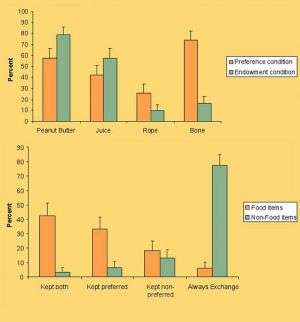What chimpanzees can teach us about economics

In a long-standing enigma of economics and psychology, humans tend to immediately value an item they've just been given more highly than the maximum amount they would have paid if they had acquired it themselves. This tendency, known as the endowment effect, is something some economists consider a fluke, but new research finds that humans aren't the only ones exhibiting an endowment effect.
A new study co-authored by Vanderbilt professor Owen Jones, who is one of the nation's few professors of both law and biology, uncovered the first evidence that chimpanzees exhibit an endowment effect similar to people. Specifically, the study showed that chimpanzees favor items they just received more than items they normally prefer that they could get through exchange.
"These findings show that chimpanzees sometimes make irrational economic choices in the same specific patterns that humans do, suggesting a common evolutionary origin rather than, as is often assumed, quirks unique to human brains and experience," said Jones.
Drawing on prior theoretical work by Jones, the researchers were able to predict variations in the endowment effects the chimpanzees exhibited.
Here's how the study worked. Jones and his research partners, including primatologist Sarah Brosnan at Georgia State University, modified a study done on people in which one group of subjects was given a coffee mug, another group was given a chocolate bar and a third group was allowed to choose between the two items. The first two groups were then offered the opportunity to exchange their item for the other. Surprisingly, both groups were much more likely to keep the item they'd been originally given, compared to the expected preferences revealed by the group with a choice.
In the chimpanzee study, Jones replaced coffee mugs and chocolate with peanut butter sticks and frozen juice bars.
The researchers first examined data for the population of chimpanzees that showed the preference for peanut butter or juice was almost half and half. But when the chimpanzees were given or "endowed" with the peanut butter, almost 80 percent of them chose to keep the peanut butter, rather than exchange it for a juice bar.
"Our results support the conclusion that the frequent failure to exchange a less favored food for a more preferred food was an active choice and is similar to the endowment effect behavior seen in humans," said Jones. "But even more significant, using an evolutionary perspective on the phenomenon helped us to discover a pattern predicted by no other prior theory. This suggests the same perspective may provide a better understanding of the endowment effect in humans."
Jones said this study helps connect law and economics to biology by providing a deeper and more useful understanding of where law-relevant behavior comes from and what factors may affect it. This also has important implications for both economics and the law because when and how the endowment effect appears can impede the efficient flow of goods and tradable rights in the marketplace.
"To the extent that a deeper understanding of humans can aid law's efforts to pursue whatever goals society assigns it, biological perspectives are an essential part of the picture," said Jones. "We study chimpanzees to learn more about ourselves."
The full research study is published in the Oct. 9 issue of Current Biology.
Source: Vanderbilt University


















